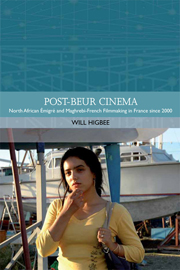Book contents
- Frontmatter
- Contents
- Acknowledgements
- List of Illustrations
- Traditions in World Cinema
- 1 Introduction: From Immigrant Cinema to National Cinema
- 2 The (Maghrebi-)French Connection: Diaspora goes Mainstream
- 3 Colonial Fracture and the Counter-Heritage Film
- 4 Of Spaces and Difference in the Films of Abdellatif Kechiche
- 5 Home, Displacement and the Myth of Return: Journey Narratives in the 2000s
- 6 Screening Islam: cinematic Representations of the Muslim Community in France in the 2000s
- 7 Conclusion: Post-Beur Cinema
- Bibliography
- Index
3 - Colonial Fracture and the Counter-Heritage Film
Published online by Cambridge University Press: 05 October 2013
- Frontmatter
- Contents
- Acknowledgements
- List of Illustrations
- Traditions in World Cinema
- 1 Introduction: From Immigrant Cinema to National Cinema
- 2 The (Maghrebi-)French Connection: Diaspora goes Mainstream
- 3 Colonial Fracture and the Counter-Heritage Film
- 4 Of Spaces and Difference in the Films of Abdellatif Kechiche
- 5 Home, Displacement and the Myth of Return: Journey Narratives in the 2000s
- 6 Screening Islam: cinematic Representations of the Muslim Community in France in the 2000s
- 7 Conclusion: Post-Beur Cinema
- Bibliography
- Index
Summary
As suggested in the previous chapter, the 2000s have been marked by a qualitative move towards the mainstream for a number of directors and actors of Maghrebi origin, a shift that has led to a greater variety of genres being used by these filmmakers in their work. At the heart of this chapter is an attempt to understand how what will be termed the counter-heritage cinema of Maghrebi-French directors in the 2000s engages with wider public debates around the memorialisation of France's colonial past (see for example Chevènement 2001; Rousso 1998; Ricoeur 2004; Blanchard et al. 2006). Writing in the late 1980s, outlining his concept of lieux de mémoires or sites of memory, historian Pierre Nora presciently described the concerns that would characterise subsequent debates in the following two decades:
We have gone from the idea of a visible past to an invisible one; from a solid and steady past to our fractured past; from a history sought in the continuity of memory to a memory cast in the discontinuity of history
(Nora 1989: 17).Central to Nora's thesis is the often conflictual relationship between memory and history. For Nora, memory is a perpetually active phenomenon that binds us to both past and future. It is affective, partial and, by its very nature, simultaneously multiple and specific (Nora 1989: 8–9). Put differently, there are at least as many memories as there are groups that remember.
- Type
- Chapter
- Information
- Post-beur CinemaNorth African Émigré and Maghrebi-French Filmmaking in France since 2000, pp. 61 - 95Publisher: Edinburgh University PressPrint publication year: 2013



